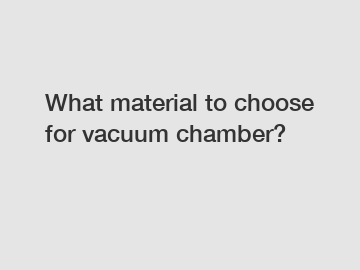What material to choose for vacuum chamber?
What material to choose for vacuum chamber?
When it comes to choosing the right material for a vacuum chamber, there are several factors to consider. The choice of material plays a crucial role in the overall performance and durability of the chamber. In this article, we will explore the different materials commonly used for vacuum chambers and discuss their properties, benefits, and drawbacks.
One of the most common materials used for vacuum chambers is stainless steel. Stainless steel has excellent corrosion resistance, high strength, and good thermal conductivity, making it suitable for a wide range of applications. Its resistance to moisture and chemicals also ensures that the chamber remains airtight and maintains a high vacuum level over an extended period. Additionally, stainless steel can withstand high temperatures and is not prone to warping or deformation, making it a reliable choice for applications that involve extreme conditions.

Another material option for vacuum chambers is aluminum. Aluminum offers several advantages, such as low weight, excellent thermal conductivity, and high electrical conductivity. These properties make aluminum an ideal choice for applications where weight reduction and efficient heat dissipation are essential. However, aluminum is less resistant to corrosion compared to stainless steel and may require periodic maintenance to ensure its longevity in corrosive environments.
In certain cases, non-metallic materials like glass or ceramics can be used for vacuum chambers. These materials offer unique benefits, such as transparency for visual inspection and excellent resistance to chemicals. Glass chambers are particularly useful when visual monitoring of the process inside the chamber is necessary. However, glass and ceramics have lower strength compared to metal options and may not be suitable for high-pressure applications or situations where mechanical stress is expected.
The choice of material for a vacuum chamber is critical as it directly affects the overall performance and safety of the system. It is important to consider the specific requirements of the application, such as temperature, pressure, and chemical compatibility. Additionally, the choice of material may also depend on cost considerations and the availability of manufacturing capabilities.
In conclusion, stainless steel is a popular choice for vacuum chambers due to its excellent corrosion resistance, strength, and thermal conductivity. Aluminum offers advantages in terms of weight reduction and heat dissipation. Non-metallic materials like glass or ceramics can provide unique benefits but may have limitations in terms of mechanical strength. Ultimately, the selection of the material should be based on a careful evaluation of the application requirements, ensuring the chamber's optimal performance and longevity.
Are you interested in learning more about Features of High-Performance Air Chambers, Air Mattress Dual Chamber, Vulcanized Rubber Air Chamber? Contact us today to secure an expert consultation!

Comments
0